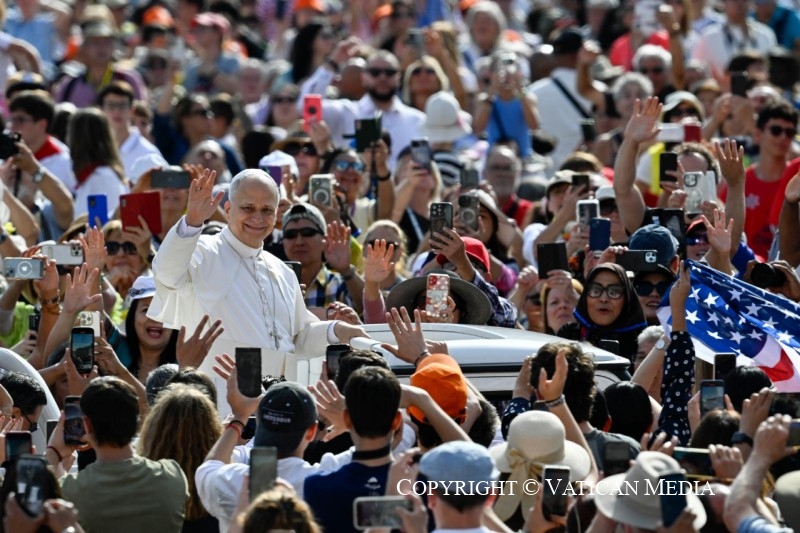Cycle of Catechesis – Jubilee 2025. Jesus Christ our Hope. III. The Passover of Jesus. 5. The Crucifiction. «I thirst» (Jn 19:28)
Dear brothers and sisters,
At the heart of the account of the Passion, in the most luminous and at the same time darkest moment of Jesus’ life, the Gospel of John gives us two words that contain an immense mystery: “I thirst” (19:28), and immediately afterwards: “It is finished” (19:30). These are his last words, but they are filled with a whole lifetime, revealing the meaning of the entire existence of the Son of God. On the cross, Jesus does not appear as a victorious hero, but as a supplicant for love. He does not proclaim, condemn or defend himself. He humbly asks for what he, alone, cannot give to himself in any way.
The thirst of the Crucified Lord is not only the physiological need of a tortured body. It is also, and above all, the expression of a profound desire: that of love, of relationship, of communion. It is the silent cry of a God who, having wished to share everything of our human condition, also lets himself be overcome by this thirst. A God who is not ashamed to beg for a sip, because in that gesture he tells us that love, in order to be true, must also learn to ask and not only to give.
I thirst, says Jesus, and in this way he manifests his humanity and also ours. None of us can be self-sufficient. No-one can save themselves. Life is “fulfilled” not when we are strong, but when we learn how to receive. It is precisely at that moment, after receiving from unknown hands a sponge soaked in vinegar, that Jesus proclaims: It is finished. Love has made itself needy, and precisely for this reason it has accomplished its work.

This is the Christian paradox: God saves not by doing, but by letting himself do. Not by defeating evil with force, but by accepting the weakness of love to the very end. On the cross, Jesus teaches us that man does not realize himself in power, but in trustful openness to others, even when they are hostile and enemies. Salvation is not found in autonomy, but in humbly recognizing one’s own need and in being able to express it freely.
The fulfilment of our humanity in God’s plan is not an act of strength, but a gesture of trust. Jesus does not save with a dramatic twist, but by asking for something that he cannot give himself. And it is here that the door to true hope opens: if even the Son of God chose not to be self-sufficient, then our thirst too – for love, for meaning, for justice – is a sign not of failure, but of truth.
This truth, seemingly so simple, is difficult to accept. We live in a time that rewards self-sufficiency, efficiency, performance. And yet the Gospel shows us that the measure of our humanity is not given by what we can achieve, but by our ability to let ourselves be loved and, when necessary, even helped.

Jesus saves us by showing us that asking is not unworthy, but liberating. It is the way out of the hiddenness of sin, so as to re-enter the space of communion. Ever since the beginning, sin has begotten shame. But forgiveness – real forgiveness – is born when we can face up to our need and no longer fear rejection.
Jesus’ thirst on the cross is therefore ours too. It is the cry of a wounded humanity that seeks living water. And this thirst does not lead us away from God, but rather unites us with him. If we have the courage to acknowledge it, we can discover that even our fragility is a bridge towards heaven. It is precisely in asking – not in possessing – that a way of freedom opens up, because we cease to pretend to be self-sufficient.
In fraternity, in the simple life, in the art of asking without shame and offering without ulterior motives, a joy is born that the world does not know. A joy that restores us to the original truth of our being: we are creatures made to give and receive love.
Dear brothers and sisters, in Christ’s thirst we can recognize all of our own thirst. And to learn that there is nothing more human, nothing more divine, than being able to say: I need. Let us not be afraid to ask, especially when it seems to us that we do not deserve. Let us not be ashamed to reach out our hand. It is right there, in that humble gesture, that salvation hides.
Source: vatican.va





